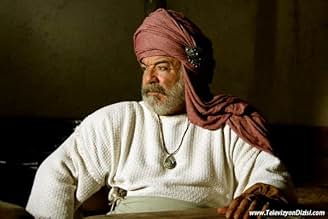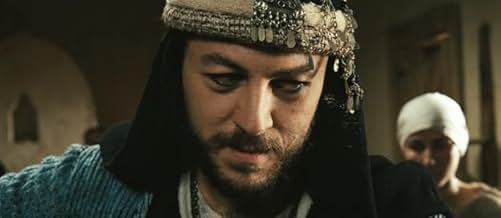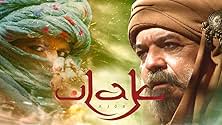Agrega una trama en tu idiomaIn a place where there is no time, a traveler comes to an unnamed village where we do not know where on the map. The weary traveler is a messenger. They have stories to tell, words to say.In a place where there is no time, a traveler comes to an unnamed village where we do not know where on the map. The weary traveler is a messenger. They have stories to tell, words to say.In a place where there is no time, a traveler comes to an unnamed village where we do not know where on the map. The weary traveler is a messenger. They have stories to tell, words to say.
- Dirección
- Guionista
- Elenco
- Premios
- 2 premios ganados y 9 nominaciones en total
Zuhal Gencer
- Cemile
- (as Zuhal Gencer Erkaya)
Yagiz Atakan Savas
- Ferhat
- (as Atakan Yagiz)
- Dirección
- Guionista
- Todo el elenco y el equipo
- Producción, taquilla y más en IMDbPro
Opiniones destacadas
First of all, the ''Turkish Cinema'' had produced the same things throughout. But this idea of making something different contrary to the meaningless, cheap movies of bad filmmakers is a very venturous business. I think that we owe Çağan Irmak therefore a debt, because his early work was ''Babam Ve Oğlum'', which was very successful in the box-office. Irmak has tried something at least but the transformation of the idea of telling a myth is done very bad to a movie. The development of the movie is very choppy, the characters are sketchy without any deepness, the music was predominantly weird and the overall performance of the actors were common to bad. But the biggest point is, that the movie was too theatrical. This attribute is not appropriated to cinema,you can find it in theaters. The director wanted to give the messages in a artless way, which made some scenes and the filmmaker funny. All in all it's a good try but nothing more...
Set in an unspecified medieval period, ULAK centers on Zekeriya, a doctor (Çetin Tekindor) who visits a village and begins to tell mysterious stories of the past, present and future to a group of children and adults. The stories focus on the power of God, the importance of remaining true to oneself and the need to overcome tyranny. The center of his tales is a crippled character Murad (Ömer Hüsnü Turat) who possesses some kind of spiritual power despite his disability.
Zekeriya's presence within the community immediately causes suspicion: what kind of power does he have over the children? For the village elders, accustomed to wielding their patriarchal power over their women and their offspring, he represents a subversive force, and therefore needs to be removed. The only snag is that he possesses the kind of resilience that is infectious - so infectious, in fact, that he encourages the children to resist their parents. Young Ferhat (Atakan Yağız) offers a case in point - despite his father's attempts to beat him into submission, he remains unbowed, and eventually departs with Zekeriya to a better world.
Part-fantasy, past religious epic, Çağan Irmak's film underlines the importance of being true to oneself, even if life's circumstances turn against you. This is way Zekeriya preaches, using his autobiographical experiences with Murad as an example. Tyrannies will never survive in a world whose inhabitants understand the existence of a higher power in whom they can trust. Such views are not only religiously important, they have an intimate bearing on contemporary politics. The film's ending is particularly satisfying, as the children and the believers go forth into a promised land, leaving the former tyrants and their families to die. ULAK is particularly harsh on those who simply follow popular sentiment without understanding anything about themselves or the societies they inhabit. They are at once the least intelligent yet most dangerous of people.
To be honest, some of the action is a little sentimental, adumbrating some of Irmak's later work such as THE SLEEPING PRINCESS (PRENSES'IN UYKUSU), especially towards the end of the the film when Zekeriye reveals the ending to his tale to the accompaniment of swirling violins on the soundtrack. There is also the question of the film's epigraph, dedicated to all children with the capacity to dream; on this view, Irmak suggests that all adults have somehow been corrupted and it is incumbent on the younger generation to create a better world. This might be true, but it suggests a view of childhood with its roots in European Romanticism rather than spirituality.
Zekeriya's presence within the community immediately causes suspicion: what kind of power does he have over the children? For the village elders, accustomed to wielding their patriarchal power over their women and their offspring, he represents a subversive force, and therefore needs to be removed. The only snag is that he possesses the kind of resilience that is infectious - so infectious, in fact, that he encourages the children to resist their parents. Young Ferhat (Atakan Yağız) offers a case in point - despite his father's attempts to beat him into submission, he remains unbowed, and eventually departs with Zekeriya to a better world.
Part-fantasy, past religious epic, Çağan Irmak's film underlines the importance of being true to oneself, even if life's circumstances turn against you. This is way Zekeriya preaches, using his autobiographical experiences with Murad as an example. Tyrannies will never survive in a world whose inhabitants understand the existence of a higher power in whom they can trust. Such views are not only religiously important, they have an intimate bearing on contemporary politics. The film's ending is particularly satisfying, as the children and the believers go forth into a promised land, leaving the former tyrants and their families to die. ULAK is particularly harsh on those who simply follow popular sentiment without understanding anything about themselves or the societies they inhabit. They are at once the least intelligent yet most dangerous of people.
To be honest, some of the action is a little sentimental, adumbrating some of Irmak's later work such as THE SLEEPING PRINCESS (PRENSES'IN UYKUSU), especially towards the end of the the film when Zekeriye reveals the ending to his tale to the accompaniment of swirling violins on the soundtrack. There is also the question of the film's epigraph, dedicated to all children with the capacity to dream; on this view, Irmak suggests that all adults have somehow been corrupted and it is incumbent on the younger generation to create a better world. This might be true, but it suggests a view of childhood with its roots in European Romanticism rather than spirituality.
this is a timeless film and a timeless story, full of hope and humanity. the actors are magnificent, especially the children and the storyteller.
altogether a beautiful experience that instills hope in everyone. in a way it is very realistic and based in a seemingly real village. then the film shifts between two stories which are linked and share some actors.
it is encouraging because it exposes evil-doers and gives hope that ethical behavior has still a great value. another plus is that the film shows a life-style of old with beautiful costumes and embellishing of the women's face and is set in a rural place which makes you quite nostalgic.
altogether a beautiful experience that instills hope in everyone. in a way it is very realistic and based in a seemingly real village. then the film shifts between two stories which are linked and share some actors.
it is encouraging because it exposes evil-doers and gives hope that ethical behavior has still a great value. another plus is that the film shows a life-style of old with beautiful costumes and embellishing of the women's face and is set in a rural place which makes you quite nostalgic.
That was what Cagan Irmak said before the movie was seen "if you are expecting clichés, you will not be satisfied". This movie was totally different. The style, the life, the people in the movie was kind of weird. However, everything was great, well prepared. Movie tells a tale about a "messenger" in ancient times. The tale tells people every side of a life, a woman lets men use her daughter for money, a bad man, a crazy woman, a boy and a girl that can not be together... Cetin Tekindor (Zekeriya) played nearly perfect in the movie. In addition, kids played their roles awesome. They were too natural, and they were living the environment. The soundtracks are great, images are impressive. One of the bests, 9/10.
the atmosphere. the architecture. the emotion. the words who becomes pillars. the image of wise story teller. and the magic in a not comfortable manner. a film who could be window to memories. or rediscover of pure story, from classic Oriental recipes. but, step by step, scene by scene, you discover it be more than charming introduction in mythical universe. but a parable who remains the perfect manner to describe the present as just one of forms of past. the expectation. the force of dream. the fear. and the curiosity. the challenge. and the bitter words. and, sure, the large slices of silence. a film who is more a window to a lost world than a fairy tale's exposure. because it reminds the roots of the life. and the importance of its values.
Selecciones populares
Inicia sesión para calificar y agrega a la lista de videos para obtener recomendaciones personalizadas
Detalles
Taquilla
- Total a nivel mundial
- USD 3,248,267
- Tiempo de ejecución
- 1h 49min(109 min)
- Color
- Relación de aspecto
- 2.35 : 1
Contribuir a esta página
Sugiere una edición o agrega el contenido que falta










